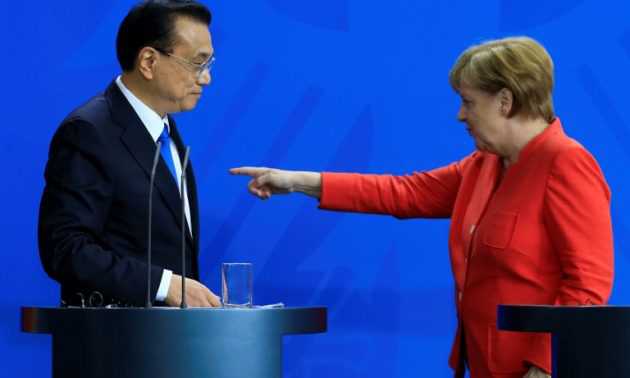A zero tariff auto deal could be true test of China’s trade mettle

Just days after the US kicked off a tariff battle with China, Premier Li Keqiang traveled to Germany on a mission to champion free trade, hoping to shore up an alliance against the Trump administration’s protectionist policies.
“We are against unilateralism – we are in favor of free trade,” Li said in a news conference, standing alongside German Chancellor Angela Merkel.
“We both want to sustain the system of World Trade Organisation rules,” Merkel said, echoing Li. “It’s a multilateral, interdependent system that at its best involves a plurilateral, win-win situation if we all stick to the rules,” Merkel added, using Beijing’s favorite diplomatic term, “win-win.”
Li took the opportunity to announce further market opening, touting China’s progress and drawing a contrast with the US move on Friday to impose tariffs on US$34 billion of Chinese goods.
But despite the media’s focus on tariffs last week, the news that moved markets, leading to gains for US equities markets and German automakers, was about the possibility of lower tariffs. In the face of threats from US President Donald Trump to enact steep duties on auto imports, European Union officials, German auto companies and Merkel herself, all expressed openness to a deal that would completely eliminate tariffs on cars.
It would be no easy task to come to such an agreement. But the olive branch from the EU, which came amid talks between the Trump administration and German officials on the issue, is in stark contrast to the EU’s response to tariffs on steel and aluminum. EU officials had responded to the metals tariffs unequivocally that they would not negotiate “at gunpoint.” With cars, they are open to talks.
A plurilateral deal, suggested by EU officials last week, would need to involve most major car exporters to comply with World Trade Organization rules. Theoretically, if the US, the EU, Japan, Canada, South Korea and Mexico were willing to sign on it would be possible.
The alternative to a deal would be devastating, should Trump follow through on his threats, with the EU already promising US$300 billion in retaliatory tariffs. It was reported on Monday that the European Commission has already drawn up a list of 18 billion euros worth of US products to target.
Unlike the opening shots of the US-China trade war, which were shrugged off by markets last week, many see the auto tariffs as being the blow to trade that would really send shockwaves through the global economy.
The top car exporters to the US are Mexico, Canada, Japan, Germany and South Korea, in that order. It is speculated that the status of Mexican and Canadian auto imports would be tied up in the renegotiation of the North American Free Trade agreement, and might be exempt, if temporarily.
The hardest hit would then be Germany, South Korea, and Japan. We already know, judging from the comments of Angela Merkel, that Germany is willing to consider such a deal. The fact that EU officials expressed openness is further indication that this is possible from Europe’s perspective.
South Korea recently agreed to phase out its 8% tariffs on US cars, which – as is the case in Japan – are not popular in the country. Would they be willing to do the same across the board?
Japanese Prime Minister Shinzo Abe said in May that Japan “cannot accept” possible tariffs on cars, but it is unclear what Japan’s response would be.
Jean-Claude Juncker, head of the European Commission, is set to meet with Trump this month and is expected to talk about the possibility of such a plurilateral deal, with an expectation that the White House could impose the car tariffs as soon as in September if no breakthrough is made.
Such a deal would mark a dramatic shift in the global trade confrontations that have been set in motion by the Trump administration. The White House has cited lowering trade barriers as the end goal of its controversial trade policy. Trump himself has repeatedly claimed that he is ready to cut all tariffs across the board, should other countries be willing to reciprocate. Last week, the US ambassador to the UK said the president is open to a zero tariff bilateral trade deal with the UK.
What would such a development mean for China?
In May, amid ongoing negotiations to avert the tit-for-tat tariff escalation that has now officially begun, China lowered tariffs on cars in what was seen as a modest concession to the US. The import taxes were pared down to 15%, from 25%, previously.
If the US, along with all other major car exporters, cut their auto import duties to zero, it might be the real test of China’s commitment to free trade. Unlike raising tariffs on Chinese goods, which gives China cover for maintaining trade barriers that are still higher than among many of its trading partners, lowering tariff barriers would force China’s hand.
Source: http://www.atimes.com